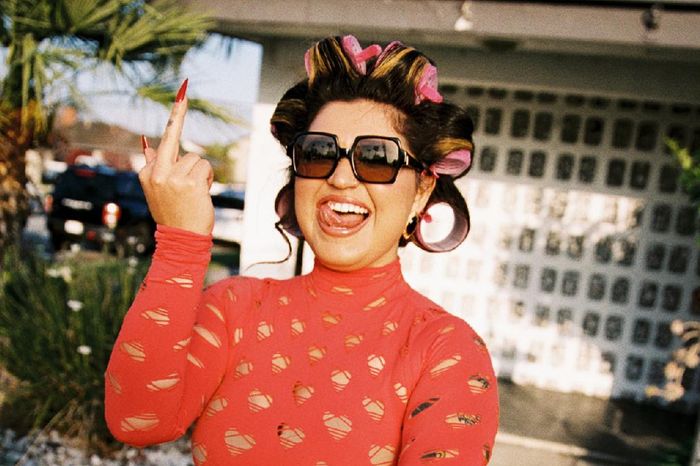
Remi Wolf may have launched her career on American Idol, but her music has never aimed for vote-accruing radio fodder. On 2021’s Juno — a stylish debut full of raunchy metaphors, off-beat production choices, and sing-songy vocal layering — Wolf sang about having orgies in Five Guys with five guys, being a grumpy old man, and “two fish kissing on my clit.” As fun as it was, it was also, by Wolf’s admission, difficult to parse by people who were not her. “There was an element of hiding the real story within these little hidden metaphors,” Wolf says now. But anyone will be able to understand her rocking new album Big Ideas. While still recognizably Wolf-ian (there’s frog sounds on one song and group chants throughout), its far more lyrically direct than her debut, as the 28-year-old performer sings about being on tour and the relationship issues it can cause, without needing much encoding.
Despite Big Ideas’ increasingly accessible storytelling, Wolf still maintains her looseness. It’s less a play to be more popular than showcasing where her head is currently at. “In the studio, I feel able to do anything, and I like to surround myself with people who also have that freedom in their hearts,” she says. “I’m not trying to actively put anything on. I’m out here trying to be myself.”
What goals did you have for this album when you began writing it?
At the beginning, I had no idea. I started touring at the end of 2021 all the way until the end of 2023. It was almost two and a half years of being on the road. I was barely home and when I was, I was in the studio. The magic and the story of this album is that I didn’t have enough time to overthink anything. I would go out on the road, come back, and document these experiences — my emotions, the hang-ups, and the changes I was going through as a person. In hindsight, the record is this coming-of-age drama of me coming into having a career and experiencing all the ups and downs of this lifestyle.
Big Ideas feels like a different side of you vocally — it sounds bigger than Juno. How did you approach recording?
I always view my voice as just another instrument to play with and to layer. Every song I’ve ever made, there’s a different persona I’m trying to embody tonally. I don’t have any fear of going fully off the wall and sounding like a crazy person. There are certain songs where I’m singing in my rendition of a British accent.
I think about “Alone in Miami,” where you are absolutely belting your face off. What is the Remi Wolf belting persona?
She is me but she doesn’t come out that often. In my live show, I am belting up an absolute fucking storm. Belting is something I love. It’s part of my DNA. Sometimes I’ll just lean into it a lot and, to be frank, it’s hard on the vocal cords. You get really tired.
Will it be possible for you to sing Big Ideas live all the way through?
I mean, we’re gonna make it happen one way or another. I am always kicking myself, because every time I write a song and then I bring it to rehearsal, I’m just like “Jesus Christ, girl, these songs are so hard to sing.” I set myself up for failure a little bit. It’s a slog. But most of the time I’m able to rise to the occasion. One of these days I will write a song that is just easy and breezy.
You say you belt more live, and then on Big Ideas, you are belting more than ever before. Do you think doing it on the road affected how you sang the album?
It’s not something I was actively thinking about, but you’re probably correct. I was belting live constantly, and it makes sense that I would bring that into the studio. Now that I think about my back catalog, the belting has made its way into the live shows a lot more than it’s made its way into recordings. Part of that, honestly, has to do with a lot of my earlier stuff being recorded in bedrooms of apartment buildings where we had to be quiet. I was able to work in bigger studios for this album, where the sole purpose of those buildings is to make noise. It was freeing.
A word that gets applied to you a lot is quirky. How do you take that?
When I think of quirky, I think of twee-era New Girl and the hipster movement or something. I’m confused about the idea of people perceiving me in any sort of way at all. I try to not think about it, and if they think that I’m quirky, it’s cool. I think I’m free. It’s so interesting because it’s journalists’ jobs to try to actively describe me, and maybe the best word in order to get it across is quirky. I don’t know if I’d use it. I mean, what do you think?
I think the word may be accurate, but there are also connotations that make it feel a little minimizing.
I can snap to that. But to be honest, I also just don’t give a fuck and if people want to say that about me, let them.
I ask about it partially because Big Ideas feels less “quirky” — you don’t have any songs as ridiculous as “Grumpy Old Man,” and the lyrics are more easily comprehensible. Why do you think that is?
It’s definitely more grown up. Within Juno, I was writing about some really deeply personal shit to me, but there was an element of hiding the real story. Through my songwriting on this album, I got more direct with my language. That was an intentional move on my part. I wanted to open myself up.
Listening to the album, one song that stuck out to me as an excising was “Cherries and Cream.” There’s an affecting self-loathing in that song. Can you tell me the story behind it?
We spent so long crafting it and I feel like it kind of transports you to a whole other dimension. It’s its own universe. That song is about being in a relationship with somebody who has another relationship. It’s about being a mistress, which is unfortunately something I’ve been in my life.
It was a non-traditional writing process, because normally when I get in the studio, I have 80 to 90 percent of the song done within the first day. With that song, we spent so long refining all the little details. I wrote the lyrics spread out over a couple months, which is also nontraditional for me, and it kind of gave me time and space to ideate on what I wanted to say.
How did the extended writing process affect the song?
I wanted it to have a Pink Floyd, Led Zeppelin, psychedelic, ’70s reminiscent vibe, which is a difficult thing to do authentically. We had to get the right gear. Lyrically, I wanted to tap into that too. Led Zeppelin wrote a lot about Lord of the Rings and these expansive places: grass and fields and hobbits and shit. I was inspired by them and approached the storytelling of this mistress love affair through that lens. “You fly, morning dove, way above my terrain.” I used nature, mystical metaphors to tell this story. In the pre-chorus, I sing “Is it wrong? Are you fearful?” To me, that was some wizard God coming down and shining his light on this fucked-up couple who are doing morally corrupt activities.
How has this newfound directness and maturity affected the visual style of Big Ideas?
I think the music videos are equally as silly and fun, but I think that it’s obvious that where we’ve been less reliant on VHS processing and it’s a little bit more clear and direct. The “Cinderella” video is Hi-Fi and it’s nice looking but it still has the very super fun editing and I was able to get out there and be myself on the hill of grass and roll around and shit. But in terms of the cameras we used a lot of film or film-emulating techniques. There’s not a lot of times that I’ve gotten into narrative music videos or storytelling and for “Motorcycle,” I wanted to go there because that song dug deeper into the imagery of what I was saying. It still has the surrealist vibe, but the visuals have gotten a little bit more direct.
Where did the need to be more direct come from?
I was going through a lot in my life. I was having all these insane experiences. I was in and out of relationships, shit was hitting the fan. I was 24 when I wrote Juno. I released it when I was 25. Now I’m 28. A lot of time has passed. I think I just grew up while writing this album. I started thinking about the bigger picture and these big ideas about my life: how I wanted to interact with the world, how I wanted to conduct myself.
Does the level of directness make it scarier to put music out?
There’s a bit of that going on. I think right now mainly what I feel is excitement. I’ve been holding these songs in for two and a half years. They were ready to be birthed or I would have gone crazy. So I’m excited. It’ll feel like a cleansing or a purge of some kind. I’m honestly super stoked to get in the weeds on making the show awesome. And then also writing a new album — I’m ready to get back into the studio ASAP.


